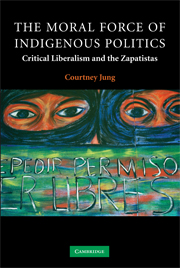Book contents
- Frontmatter
- Contents
- Acknowledgments
- Introduction
- 1 Stepping behind the claims of culture: constructing identities, constituting politics
- 2 Internal colonialism in Mexican state formation
- 3 “The politics of small things”
- 4 From peasant to indigenous: shifting the parameters of politics
- 5 The politics of indigenous rights
- 6 Critical liberalism
- Appendix: tables – indigenous population
- Bibliography
- Index
- CONTEMPORARY POLITICAL THEORY
Introduction
Published online by Cambridge University Press: 14 September 2009
- Frontmatter
- Contents
- Acknowledgments
- Introduction
- 1 Stepping behind the claims of culture: constructing identities, constituting politics
- 2 Internal colonialism in Mexican state formation
- 3 “The politics of small things”
- 4 From peasant to indigenous: shifting the parameters of politics
- 5 The politics of indigenous rights
- 6 Critical liberalism
- Appendix: tables – indigenous population
- Bibliography
- Index
- CONTEMPORARY POLITICAL THEORY
Summary
In the hours before first light on New Year's Day of 1994, soldiers of the Zapatista National Liberation Army (EZLN) slipped down from the mountains under cover of mist and captured four towns in southern Mexico. In San Cristóbal de las Casas they occupied the central square and the municipal buildings. In Ocosingo they took over the radio station, broadcasting news of the revolution. With surprise on their side, they held off Mexican soldiers stationed at a nearby army garrison, even though many of the rebels carried only wooden replicas of guns or no weapons at all.
On January 2, Subcomandante Marcos began to issue statements and press releases, and he established contact with the chief editor of a prominent national newspaper in Mexico City. He explained that what drove Mexico's peasants to violence was the suspension of land redistribution through the amendment of Article 27 of the Constitution. The uprising took place on the day the North American Free Trade Agreement (NAFTA) went into effect, and the insurgents took a stand against neo-liberalism and globalization. In their first communiqué, the EZLN demanded land, housing, schools, jobs with fair wages, hospitals, roads, an end to NAFTA, and democracy.
The Mexican army was quick to reinforce its presence in Chiapas and retaliated against the rebels, taking back the towns the Zapatistas had occupied within a few days. Approximately 400 people – mostly rebels and civilians – were killed in fighting over the next two weeks.
- Type
- Chapter
- Information
- The Moral Force of Indigenous PoliticsCritical Liberalism and the Zapatistas, pp. 1 - 33Publisher: Cambridge University PressPrint publication year: 2008

